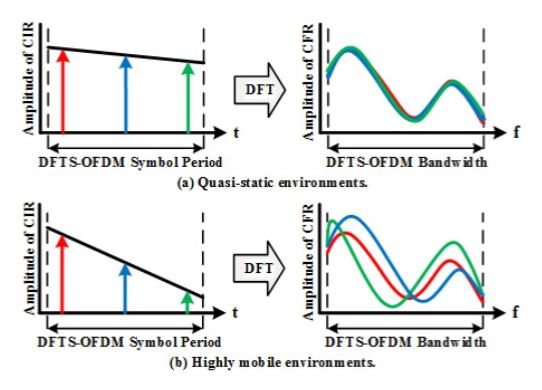Iterative Based Time Domain Equalization Method for DFTS-OFD in Highly Mobile Environments
Main Article Content
Abstract
In highly mobile environments, signal quality of discrete Fourier transform spreading-orthogonal frequency division multiplexing (DFTS-OFDM) with a frequency domain equalization method would be degraded due to the occurrence of inter-channel interference (ICI). To solve this problem, this paper proposes an iterative based time domain equalization (TDE) method with a time domain channel impulse response (CIR) estimation for DFTS-OFDM signals. The salient features of the proposed method are the use of a time domain training sequence (TS) in the estimation of CIR instead the conventional pilot subcarriers and to employ the TDE method with a maximum likelihood (ML) estimation instead of the conventional one-tap minimum mean square error frequency domain equalization (One-Tap MMSE- FDE) method. This paper also proposes a low complexity iterative based TDE method using the properties of a symmetric banded CIR transfer matrix for solving the simultaneous equations instead of direct calculation of an inverse matrix. It also presents various simulation results in highly mobile environments to demonstrate the effectiveness of the proposed iterative based TDE with CIR estimation for the TS inserted DFTS-OFDM signals compared to the conventional One-Tap MMSE-FDE method.
Article Details
References
D. Falconer, S. L. Ariyavisitakul, A. Benyamin-
Seeyar, and B. Eidson, “Frequency domain
equalization for single-carrier broadband wireless
systems,” IEEE Commun. Mag., vol. 40, pp.
-66, Apr. 2002.
N. Benvenuto and S. Tomasin, “On the comparison
between OFDM and single carrier modulation
with a DFE using a frequency-domain feed
forward filter,” IEEE Trans. Commun. Mag.,
vol. 50, pp. 947-955, Jun. 2002.
G. M. Hyung, L. Junsung, and J. G. David, “Single
carrier FDMA for uplink wireless transmission,”
IEEE Vehicular Technology. Mag., vol. 1,
no. 3, pp. 30-38, Sep. 2006.
D. Y. Seol, U. K. Kwon, and G. H. Im, “Performance
of single carrier transmission with cooperative
diversity over fast fading channels,” IEEE
Trans. Commun., vol. 57, no. 9, pp. 2799-2807,
Sep. 2009.
A. Ghosh, R. Ratasuk, B. Mondal, N. Mangalvedhe,
and T. Thomas, “LTE-advanced:
next-generation wireless broadband technology,”
IEEE Wireless Commun., vol. 17, no. 3, pp. 10-
, Jun. 2010.
3GPP TS 36.211, Evolved Universal Terrestrial
Radio Access (EUTRA); Physical Channels and
Modulation, 3GPP Standard, Rev. 10.0.0, 2011.
L. Yang, G. Ren, B. Yang, and Z. Qiu, “Fast
Time-Varying Channel Estimation Technique for
LTE Uplink in HST Environment,” IEEE Trans.
Vehicular Technology, vol. 61, no. 9, Nov. 2012.
G. Li, H. Yang, L. Cai and L. Gui, “A Lowcomplexity
Equalization Technique for OFDM
System in Time-Variant Multipath Channels,”
in Proc. IEEE on vehicular technology confer-
ence (VTC 2003-Fall), Vol. 4, pp. 2466-2470,
Oct. 2003.
C. Ma, S. Liu and C. Huang, “Low-Complexity
ICI Suppression Methods Utilizing Cyclic Prefix
for OFDM Systems in High-Mobility Fading
Channels,” IEEE Trans. Vehicular Technology,
vol. 63, no. 2, pp. 718-730, Feb. 2014.
P. Reangsuntea, M. Hourai, P. Boonsrimuang,
K. Mori, and H. Kobayashi, “Iterative based ML
Demodulation Method for OFDM Signal under
Higher Mobile Environments,” in Proc. IEEE on
vehicular technology conference (VTC-Spring),
pp. 1-6, May 2015.
P. Reangsuntea, P. Boonsrimuang, K. Mori,
and H. Kobayashi, “Time domain equalization
method for DFTS-OFDM signal without GI under
high mobile environments,” in Proc. of 12nd
International Conference on Electrical Engineer-
ing/Electronics, Computer, Telecommunications
and Information Technology (ECTI-CON), pp.
-6, June 2015.
A. Reangsuntea, P. Reangsuntea, P. Boonsrimuang,
K. Mori, and H. Kobayashi, “Iterative
based Time Domain Equalization Method
for DFTS-OFDM under Highly Mobile Environments,”
in Proc. of 13th International Con-
ference on Electrical Engineering/Electronics,
Computer, Telecommuni- cations and Informa-
tion Technology (ECTI-CON), June 2016.
C. Vulk, “Iterative Solution methods,” Delft
Institute of Applied Mathematics, Netherlands,
Andrew J. Viterbi, “Error Bounds for Convolutional
Codes and an Asymptotically Optimum
Decoding Algorithm,” IEEE Transactions on In-
formation Theory, Volume IT-13, pp. 260-269,
Apr. 1967.


